| |
Date |
Event(s) |
| 1 | 1812 | - 8 Jun 1812—9 Apr 1827: Earl of Liverpool - 22nd British Prime Minister
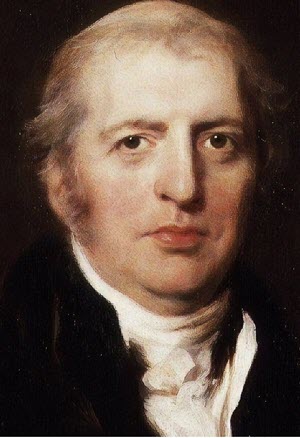
Robert Banks Jenkinson, 2nd Earl of Liverpool, (7 June 1770 – 4 December 1828) was a British statesman and Prime Minister (1812–27). As Prime Minister, Liverpool called for repressive measures at domestic level to maintain order after the Peterloo Massacre of 1819. He dealt smoothly with the Prince Regent when King George III was incapacitated. He also steered the country through the period of radicalism and unrest that followed the Napoleonic Wars. He favoured commercial and manufacturing interests as well as the landed interest. He sought a compromise of the heated issue of Catholic emancipation. The revival of the economy strengthened his political position. By the 1820s he was the leader of a reform faction of "Liberal Tories" who lowered the tariff, abolished the death penalty for many offences, and reformed the criminal law.
|
| 2 | 1820 | - 29 Jan 1820—26 Jun 1830: King George IV's reign
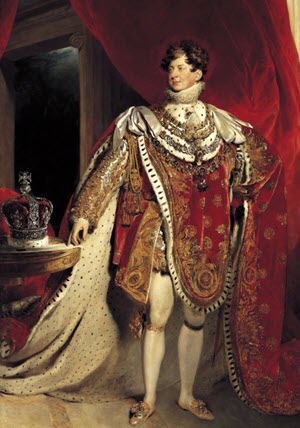
George IV was King of the United Kingdom of Great Britain and Ireland and King of Hanover following the death of his father, King George III, on 29 January 1820, until his own death ten years later. From 1811 until his accession, he served as Prince Regent during his father's final mental illness.
George IV led an extravagant lifestyle that contributed to the fashions of the Regency era. He was a patron of new forms of leisure, style and taste. He commissioned John Nash to build the Royal Pavilion in Brighton and remodel Buckingham Palace, and Sir Jeffry Wyattville to rebuild Windsor Castle.
His charm and culture earned him the title "the first gentleman of England", but his dissolute way of life and poor relationships with his parents and his wife earned him the contempt of the people and dimmed the prestige of the monarchy.
|
| 3 | 1827 | - 5 Apr 1827: Joseph Lister born
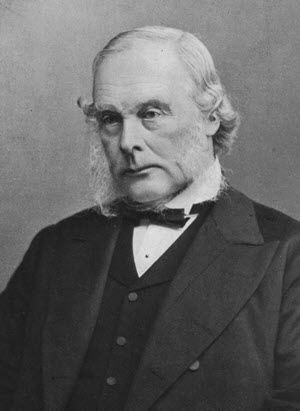
Joseph Lister, 1st Baron Lister, (5 April 1827 – 10 February 1912), was a British surgeon and a pioneer of antiseptic surgery. He promoted the idea of sterile surgery while working at the Glasgow Royal Infirmary. Lister successfully introduced carbolic acid (now known as phenol) to sterilise surgical instruments and to clean wounds.
Applying Louis Pasteur's advances in microbiology, Lister championed the use of carbolic acid as an antiseptic, so that it became the first widely used antiseptic in surgery. He first suspected it would prove an adequate disinfectant because it was used to ease the stench from fields irrigated with sewage waste.
Lister's work led to a reduction in post-operative infections and made surgery safer for patients, distinguishing him as the "father of modern surgery".
- 12 Apr 1827—8 Aug 1827: George Canning - 23rd British Prime Minister
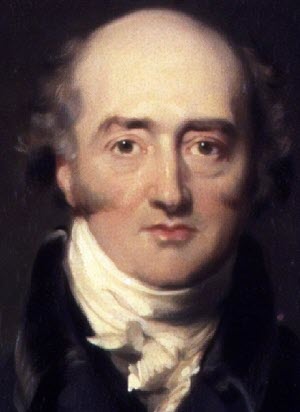
George Canning (11 April 1770 – 8 August 1827) was a British Tory statesman who served as Prime Minister of the United Kingdom from April to August 1827. He occupied various senior cabinet positions under numerous prime ministers, before eventually serving himself as Prime Minister for the final four months of his life.
He died after a mere 119 days in office which, to this day, remains the shortest tenure of any British Prime Minister.
- 31 Aug 1827—8 Jan 1828: Viscount Goderich - 24th British Prime Minister
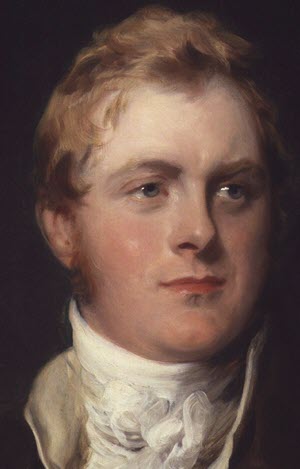
Frederick John Robinson, 1st Earl of Ripon, (1 November 1782 – 28 January 1859), known as The Viscount Goderich between 1827 and 1833, the name by which he is best known to history, was a British politician during the Regency era. He was Prime Minister of the United Kingdom between August 1827 and January 1828.
When the Prime Minister, George Canning, died in 1827 Goderich succeeded him, but was unable to hold together Canning's fragile coalition of moderate Tories and Whigs. He resigned after 144 days in office, the shortest in history for any British prime minister who did not die in office.
|
| 4 | 1828 | - 22 Jan 1828—16 Nov 1830: Duke of Wellington - 25th British Prime Minister
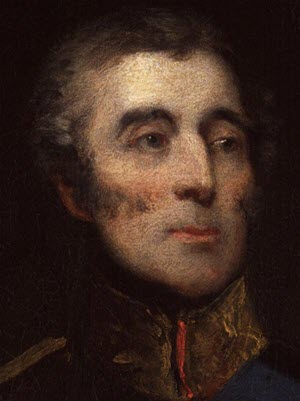
Arthur Wellesley, 1st Duke of Wellington, (1 May 1769 – 14 September 1852) was an Anglo-Irish soldier and Tory statesman who was one of the leading military and political figures of 19th-century Britain, serving twice as Prime Minister. His victory against Napoleon at the Battle of Waterloo in 1815 puts him in the first rank of Britain's military heroes.
His term as PM was marked by Catholic emancipation: the granting of almost full civil rights to Catholics in Great Britain and Ireland. The change was prompted by the landslide by-election win of Daniel O'Connell, an Irish Catholic proponent of emancipation, who was elected despite not being legally allowed to sit in Parliament. In the House of Lords, facing stiff opposition, Wellington spoke for Catholic Emancipation, and according to some sources, gave one of the best speeches of his career.
|
| 5 | 1830 | - 26 Jun 1830—20 Jun 1837: King William IV's reign
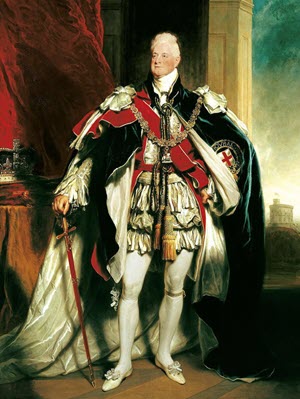
William IV was King of the United Kingdom of Great Britain and Ireland from 26 June 1830 until his death in 1837. The third son of George III, William succeeded his elder brother George IV, becoming the last king and penultimate monarch of Britain's House of Hanover.
William served in the Royal Navy in his youth and was nicknamed the "Sailor King". In 1789, he was created Duke of Clarence and St Andrews. In 1827, he was appointed as Britain's first Lord High Admiral since 1709. As his two older brothers died without leaving legitimate issue, he inherited the throne when he was 64 years old. His reign saw several reforms: the poor law was updated, child labour restricted, slavery abolished in nearly all of the British Empire, and the British electoral system refashioned by the Reform Act 1832. He was the last monarch to appoint a prime minister contrary to the will of Parliament.
At the time of his death William had no surviving legitimate children. He was succeeded by his niece Victoria and in Hanover by his brother Ernest Augustus.
- 22 Nov 1830—9 Jul 1834: Earl Grey - 26th British Prime Minister
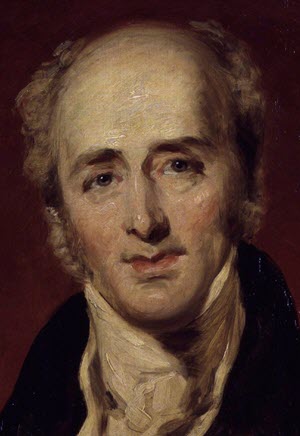
Charles Grey, 2nd Earl Grey, (13 March 1764 – 17 July 1845), known as Viscount Howick between 1806 and 1807, was a member of the Whig Party and was a long-time leader of multiple reform movements, most famously the Reform Act 1832. His government also saw the abolition of slavery in the British Empire, in which the government purchased slaves from their owners in 1833. Grey was a strong opponent of the foreign and domestic policies of William Pitt the Younger in the 1790s. In 1807, he resigned as foreign secretary to protest the King's uncompromising rejection of Catholic Emancipation. Grey finally resigned in 1834 over disagreements in his cabinet regarding Ireland, and retired from politics.
Earl Grey tea is named after him.
|
| 6 | 1831 | - 1831: James Clerk Maxwell born
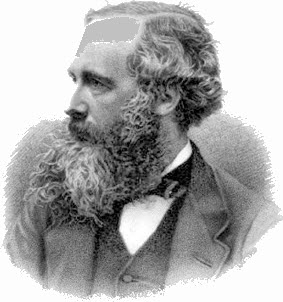
James Clerk Maxwell (13 June 1831 – 5 November 1879) was a Scottish scientist in the field of mathematical physics. His most notable achievement was to formulate the classical theory of electromagnetic radiation, bringing together for the first time electricity, magnetism, and light as different manifestations of the same phenomenon. Maxwell's equations for electromagnetism have been called the "second great unification in physics" after the first one realised by Isaac Newton.
His discoveries helped usher in the era of modern physics, laying the foundation for such fields as special relativity and quantum mechanics. Many physicists regard Maxwell as the 19th C scientist having the greatest influence on 20th C physics. On the centenary of Maxwell's birthday, Einstein described Maxwell's work as the "most profound and the most fruitful that physics has experienced since the time of Newton".
|
| 7 | 1832 | - 6 Apr 1832—27 Aug 1832: Black Hawk War

The Black Hawk War was a brief conflict between the United States and Native Americans led by Black Hawk, a Sauk leader. The war erupted soon after Black Hawk and a group of Sauks, Meskwakis, and Kickapoos, known as the "British Band", crossed the Mississippi River, into the U.S. state of Illinois, from Iowa Indian Territory in April 1832. Black Hawk's motives were ambiguous, but he was apparently hoping to avoid bloodshed while resettling on tribal land that had been ceded to the United States in the disputed 1804 Treaty of St. Louis.
The war gave the young captain Abraham Lincoln his brief military service, although he never participated in a battle. Other participants who later became famous included Winfield Scott, Zachary Taylor, and Jefferson Davis. The war gave impetus to the U.S. policy of Indian removal, in which Native American tribes were pressured to sell their lands and move west of the Mississippi River and stay there.
|
| 8 | 1833 | - 1833: Slavery Abolition Act

The Slavery Abolition Act abolished slavery in the British Empire. This Act expanded the jurisdiction of the Slave Trade Act 1807 which made the purchase or ownership of slaves illegal within the British Empire, with the exception "of the Territories in the Possession of the East India Co", Ceylon (Sri Lanka), & Saint Helena. The Act was repealed in 1997 as part of a review of English statute but later anti-slavery legislation remains
|
| 9 | 1834 | - 1834: New Poor Law reforms Britain's social security system
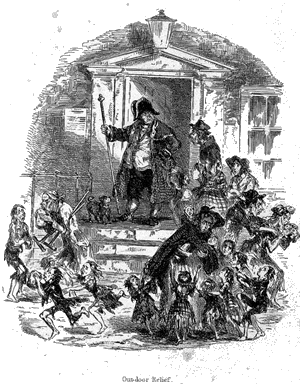
In 1832, a Royal Commission into the Poor Law recommended changes to the system of parish poor relief. Many of its recommendations were incorporated into the Poor Law Amendment Act of 1834.
This statute maintained outdoor relief (relief given outside a workhouse), but led to more central control of the system
- 1834: The Workhouse

The Workhouse originated in the Poor Law Act 1388 but mass unemployment after the Napoleonic Wars, & the introduction of technology to replace agricultural workers meant the established system was unsustainable. The Poor Law of 1834 discouraged the provision of relief to anyone who refused to enter a workhouse. Life in a workhouse was harsh but in the provision of free medical care & education for children inmates were advantaged over the general population
- 16 Jul 1834—14 Nov 1834: Viscount Melbourne - 27th British Prime Minister
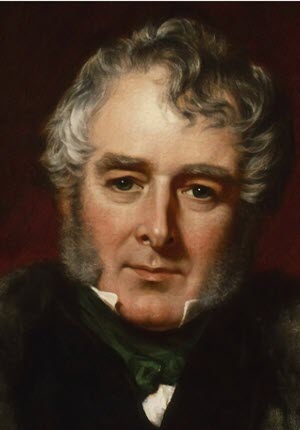
William Lamb, 2nd Viscount Melbourne, (15 March 1779 – 24 November 1848) was a British Whig statesman who served as Home Secretary (1830–1834) and Prime Minister (1834 and 1835–1841). He is best known for his intense and successful mentoring of Queen Victoria in the ways of politics, when she was between the ages of 18 and 21. Historians have concluded that Melbourne does not rank highly as a Prime Minister, for there were no great foreign wars or domestic issues to handle, he lacked major achievements, and he enunciated no grand principles. "But he was kind, honest and not self-seeking."
Melbourne was Prime Minister on two occasions. The first ended when he was dismissed by King William IV in 1834, the last British prime minister to be dismissed by a monarch. Six months later he was re-appointed and served for six years.
- 17 Nov 1834—9 Dec 1834: Duke of Wellington - 28th British Prime Minister

Arthur Wellesley, 1st Duke of Wellington, (1 May 1769 – 14 September 1852) was an Anglo-Irish soldier and Tory statesman who was one of the leading military and political figures of 19th-century Britain, serving twice as Prime Minister. His victory against Napoleon at the Battle of Waterloo in 1815 puts him in the first rank of Britain's military heroes.
This, his second term as PM, was a caretaker role until a new leader was found.
- 10 Dec 1834—8 Apr 1835: Robert Peel - 29th British Prime Minister
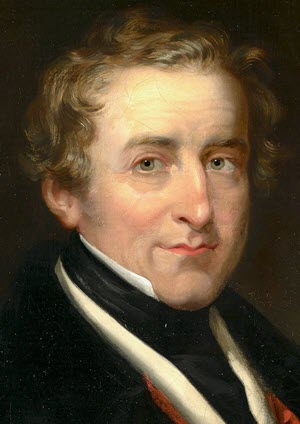
Sir Robert Peel, 2nd Baronet, (5 February 1788 – 2 July 1850) was a British statesman and Conservative Party politician who served twice as Prime Minister of the United Kingdom (1834–35 and 1841–46) and twice as Home Secretary (1822–27 and 1828–30). He is regarded as the father of modern British policing and as one of the founders of the modern Conservative Party.
His first administration was a minority government, dependent on Whig support and with Peel serving as his own Chancellor of the Exchequer. After only four months, his government collapsed and he served as Leader of the Opposition during the second government of the Viscount Melbourne (1835–1841).
|
| 10 | 1835 | - 18 Apr 1835—30 Aug 1841: Viscount Melbourne - 30th British Prime Minister

William Lamb, 2nd Viscount Melbourne, (15 March 1779 – 24 November 1848) was a British Whig statesman who served as Home Secretary (1830–1834) and Prime Minister (1834 and 1835–1841). He is best known for his intense and successful mentoring of Queen Victoria in the ways of politics, when she was between the ages of 18 and 21. Historians have concluded that Melbourne does not rank highly as a Prime Minister, for there were no great foreign wars or domestic issues to handle, he lacked major achievements, and he enunciated no grand principles. "But he was kind, honest and not self-seeking."
Melbourne was Prime Minister on two occasions. The first ended when he was dismissed by King William IV in 1834, the last British prime minister to be dismissed by a monarch. Six months later he was re-appointed and served for six years.
|
| 11 | 1837 | - 20 Jun 1837—22 Jan 1901: Queen Victoria's reign

Victoria was Queen of the United Kingdom of Great Britain and Ireland from 20 June 1837 until her death. On 1 May 1876, she adopted the additional title of Empress of India.
Victoria inherited the throne at the age of 18, after her father's three elder brothers had all died leaving no surviving legitimate children. She became a national icon who was identified with strict standards of personal morality. Victoria married her first cousin Prince Albert. After his death in 1861, Victoria plunged into deep mourning and avoided public appearances. As a result, republicanism temporarily gained strength but in the latter half of her reign, her popularity recovered. Her Golden and Diamond Jubilees were times of public celebration.
- 1 Jul 1837: Registration of BMDs begins
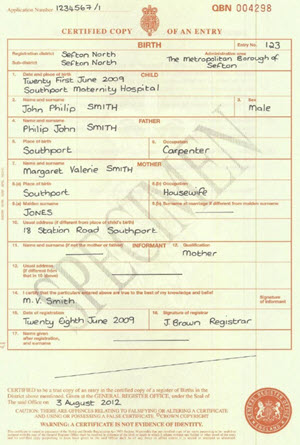
Before 1837, there was no national system of civil registration in England and Wales. Baptisms, marriages and burials were recorded in parish registers maintained by Church of England clergy. With the increase in nonconformity baptisms, marriages and burials were going unrecorded. The Parochial Registers Act of 1812 did not recognise the church registers of Nonconformists. Eventually, this led to the 1836 Registration and Marriage Acts
|
| 12 | 1840 | - 1840: Houses of Parliament
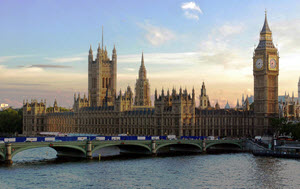
More correctly known as the Palace of Westminster, the Houses of Parliament are the meeting places of the Houses of Commons and Lords. The name is from the neighbouring Westminster Abbey.While the present buildings make look as though they date from the Gothic Period of the 14th and 15th Centuries, they were built between 1840 and 1870 following the 1834 fire
- 1840: British Migration to New Zealand begins
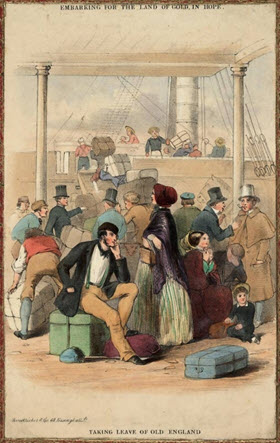
British Migration to New Zealand: In early 19th C, Britain conditions were such that millions set off for the New World. By 1839 there were only 2,000 immigrants in New Zealand, by 1852, 28,000. The decisive moment for this change was 1840 when the Treaty of Waitangi was signed. This established British authority in European eyes, and gave British immigrants legal rights as citizens. The treaty helped ensure that for 100+ years, most immigrants would come from the UK
|
| 13 | 1841 | - 30 Aug 1841—29 Jun 1846: Robert Peel - 31st British Prime Minister

Sir Robert Peel, 2nd Baronet, (5 February 1788 – 2 July 1850) was a British statesman and Conservative Party politician who served twice as Prime Minister of the United Kingdom (1834–35 and 1841–46) and twice as Home Secretary (1822–27 and 1828–30). He is regarded as the father of modern British policing and as one of the founders of the modern Conservative Party.
His second government ruled for five years. He cut tariffs to stimulate trade; to replace the lost revenue he pushed through a 3% income tax. He played a central role in making free trade a reality and set up a modern banking system.
|
| 14 | 1842 | - 1842: Income Tax
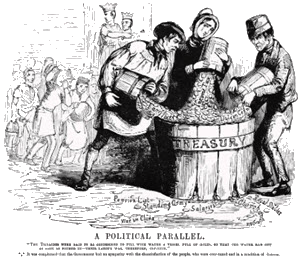
Following the end of the Napoleonic War in 1815, the public mood of compliance with income tax rapidly evaporated. The government wanted to retain it to help reduce the National Debthowever, strong public opposition to the tax was demonstrated by landowners, merchants, manufacturers, bankers, and tradesmen. On 18 March 1816, the government was narrowly defeated on the issue and was forced to abandon it.
By the early 1840s business opinion had moved towards 'free trade' and the removal of high protective duties on imports and exports. Sir Robert Peel, the Prime Minister, was keen to facilitate this thinking. In 1842, therefore, he re-introduced income tax at 7d in the pound on incomes over £150. This allowed him to remove import and export duties on more than 700 items.
- 1842: First Chemical Fertiliser
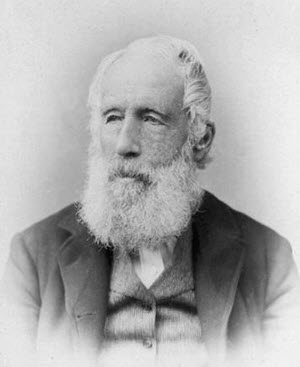
Sir John Bennet Lawes, 1st Baronet, FRS (28 December 1814 – 31 August 1900) was an English entrepreneur and agricultural scientist. He founded an experimental farm at his home at Rothamsted Manor that eventually became the Rothamsted Experimental Station, where he developed and, in 1842, patented a superphosphate that would mark the beginnings of the chemical fertilizer industry
|
| 15 | 1843 | - 1843: SS Great Britain Launched
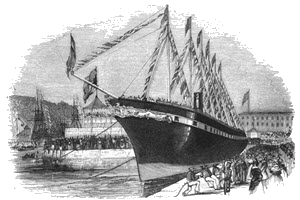
SS Great Britain is a museum ship and former passenger steamship, and was advanced for her time. She was the longest passenger ship in the world from 1845 to 1854. She was designed by Isambard Kingdom Brunel (1806–1859), for the Great Western Steamship Company's transatlantic service between Bristol and New York. While other ships had been built of iron or equipped with a screw propeller, the Great Britain was the first to combine these features in a large ocean-going ship. She was the first iron steamer to cross the Atlantic, which she did in 1845, in 14 days.
|
| 16 | 1846 | - 30 Jun 1846—21 Feb 1852: John Russell - 32nd British Prime Minister
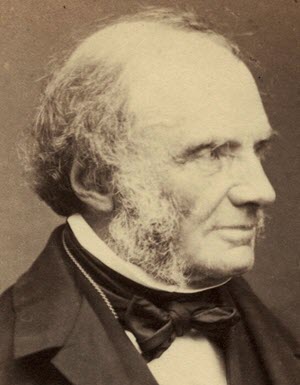
John Russell, 1st Earl Russell, (18 August 1792 – 28 May 1878), known by his courtesy title Lord John Russell before 1861, was a leading Whig and Liberal politician who served as Prime Minister of the United Kingdom on two occasions during the early Victorian era.
He headed a government that failed to deal with the Irish Potato Famine, a disaster which saw the loss of a quarter of that country's population. It has been said that his ministry of 1846 to 1852 was the ruin of the Whig party: it never composed a Government again, and his ministry of 1865 to 1866 was very nearly the ruin of the Liberal Party also.
|
| 17 | 1847 | - 1847: Alexander Graham Bell born
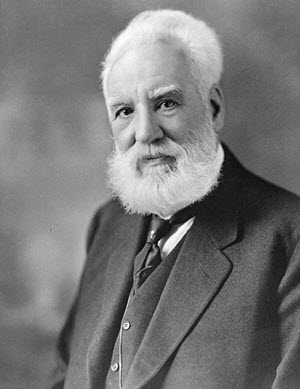
Alexander Graham Bell was a Scottish-born scientist, inventor, engineer, and innovator who is credited with inventing and patenting the first practical telephone. He also founded the American Telephone and Telegraph Company (AT&T) in 1885.
Bell's father, grandfather, and brother had all been associated with work on elocution and speech and both his mother and wife were deaf, profoundly influencing Bell's life's work. His research on hearing and speech further led him to experiment with hearing devices which eventually culminated in Bell being awarded the first U.S. patent for the telephone in 1876. Bell considered his invention an intrusion on his real work as a scientist and refused to have a telephone in his study
|
| 18 | 1851 | - 1851: The Great Exhibition
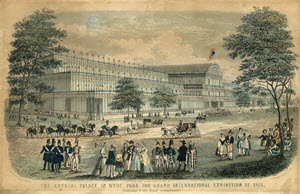
The Great Exhibition of the Works of Industry of All Nations or The Great Exhibition, sometimes referred to as the Crystal Palace Exhibition in reference to the temporary structure in which it was held, was an international exhibition that took place in Hyde Park, London, from 1 May to 15 October 1851. It was the first in a series of World's Fairs, exhibitions of culture and industry that became popular in the 19th century, and it was a much anticipated event. It was organized by Henry Cole and Prince Albert, husband of the reigning monarch, Queen Victoria. It was attended by famous people of the time,
|
| 19 | 1852 | - 23 Feb 1852—17 Dec 1852: Earl of Derby - 33rd British Prime Minister
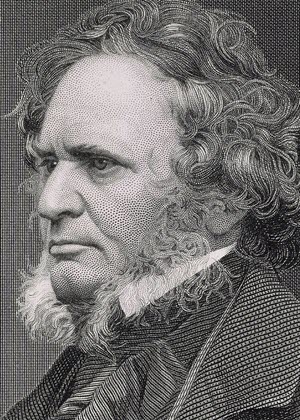
Edward George Geoffrey Smith-Stanley, 14th Earl of Derby, (29 March 1799 – 23 October 1869) was a British statesman, three-time Prime Minister of the United Kingdom and, to date, the longest-serving leader of the Conservative Party. He was known before 1834 as Edward Stanley, and from 1834 to 1851 as Lord Stanley. He is one of only four British prime ministers to have three or more separate periods in office. However, his ministries all lasted less than two years and totalled three years and 280 days.
Derby formed a minority government in February 1852 following the collapse of Lord John Russell's Whig Government. When the aged Duke of Wellington, by then very deaf, heard the list of inexperienced cabinet ministers being read aloud in the House of Lords, he gave the government its nickname by shouting "Who? Who?" From then this government would be known as the "Who, Who" government
- 19 Dec 1852—30 Jan 1855: Earl of Aberdeen - 34th British Prime Minister
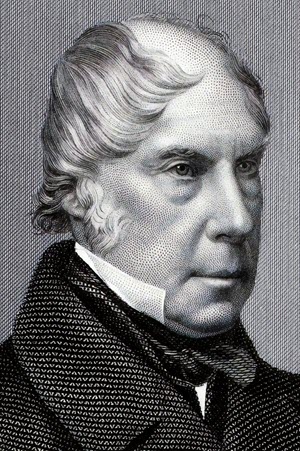
George Hamilton-Gordon, 4th Earl of Aberdeen, (28 January 1784 – 14 December 1860), was a British statesman, diplomat and landowner, successively a Tory, Conservative and Peelite politician, who served as Prime Minister from 1852 until 1855 in a coalition between the Whigs and Peelites, with Radical and Irish support.
The Aberdeen ministry was filled with powerful and talented politicians, whom Aberdeen was largely unable to control and direct. Despite trying to avoid this happening, it took Britain into the Crimean War, and fell when its conduct became unpopular, after which Aberdeen retired from politics.
|
| 20 | 1854 | - 1854—1856: Crimean War

The Crimean War was fought by an alliance of Britain, France, Turkey and Sardinia against Russian expansion into the Danube region (modern day Romania). One battle - The Battle of Balaclava - became famous for the Charge of the Light Brigade The Crimean war also saw the rise to prominence of Florence Nightingale.
|
| 21 | 1855 | - 6 Feb 1855—19 Feb 1858: Viscount Palmerston - 35th British Prime Minister
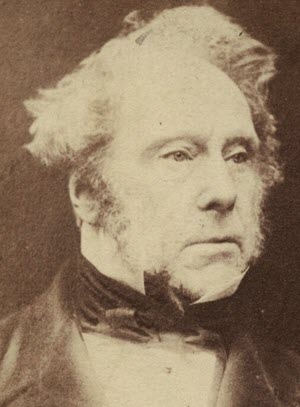
Henry John Temple, 3rd Viscount Palmerston, (20 October 1784 – 18 October 1865) was a British statesman who served twice as Prime Minister in the mid-19th century. Palmerston dominated British foreign policy during the period 1830 to 1865, when Britain was at the height of her imperial power. He held office almost continuously from 1807 until his death in 1865. He began his parliamentary career as a Tory, defected to the Whigs in 1830, and became the first Prime Minister of the newly formed Liberal Party in 1859.
He had two periods in office, 1855–1858 and 1859–1865, before his death at the age of 80 years, a few months subsequent to victory in a general election in which he had achieved an increased majority. He remains, to date, the last Prime Minister to die in office.
|
| 22 | 1858 | - 20 Feb 1858—11 Jun 1859: Earl of Derby - 36th British Prime Minister

Edward George Geoffrey Smith-Stanley, 14th Earl of Derby, (29 March 1799 – 23 October 1869) was a British statesman, three-time Prime Minister of the United Kingdom and, to date, the longest-serving leader of the Conservative Party. He was known before 1834 as Edward Stanley, and from 1834 to 1851 as Lord Stanley. He is one of only four British prime ministers to have three or more separate periods in office. However, his ministries all lasted less than two years and totalled three years and 280 days.
Among the notable achievements of this, his second administration, was the end of the British East India Company following the Sepoy Mutiny, which brought India under direct British control for the first time. Once again the government was short-lived, resigning after only one year, having narrowly lost a vote of no-confidence
|
| 23 | 1859 | - 1859: Sir Arthur Conan Doyle born
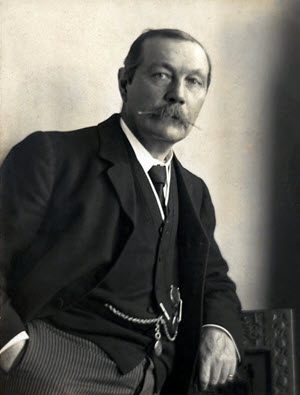
Sir Arthur Conan Doyle was Scottish author who created the legendary character, 'Sherlock Holmes.' He wrote over 60 'Sherlock Holmes' stories and many non-fiction, works of fantasy, science-fiction, poetry and historical novels. He went to medical school and set up his own practice. His medical career did not succeed and he began writing while he waited for patients. The rest is history.
- 12 Jun 1859—18 Oct 1865: Viscount Palmerston - 37th British Prime Minister

Henry John Temple, 3rd Viscount Palmerston, (20 October 1784 – 18 October 1865) was a British statesman who served twice as Prime Minister in the mid-19th century. Palmerston dominated British foreign policy during the period 1830 to 1865, when Britain was at the height of her imperial power. He held office almost continuously from 1807 until his death in 1865. He began his parliamentary career as a Tory, defected to the Whigs in 1830, and became the first Prime Minister of the newly formed Liberal Party in 1859.
He had two periods in office, 1855–1858 and 1859–1865, before his death at the age of 80 years, a few months subsequent to victory in a general election in which he had achieved an increased majority. He remains, to date, the last Prime Minister to die in office.
- 24 Nov 1859: On the Origin of Species published

On the Origin of Species (or more completely, On the Origin of Species by Means of Natural Selection, or the Preservation of Favoured Races in the Struggle for Life), published on 24 November 1859, is a work of scientific literature by Charles Darwin which is considered to be the foundation of evolutionary biology. Darwin's book introduced the scientific theory that populations evolve over the course of generations through a process of natural selection. It presented a body of evidence that the diversity of life arose by common descent through a branching pattern of evolution. Darwin included evidence that he had gathered on the Beagle expedition in the 1830s and his subsequent findings from research, correspondence, and experimentation.
|
| 24 | 1863 | - 1863: First Underground Railways
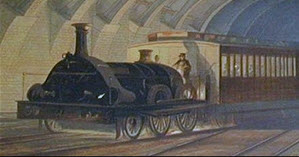
The history of the London Underground began with the construction of the Metropolitan Railway, the world's first underground railway which opened in 1863 using gas-lit wooden carriages hauled by steam locomotives. The Metropolitan eventually extended more than 50 miles from Baker Street, London. By 1907 the District and Metropolitan Railways had electrified the underground sections of their lines.
|
| 25 | 1865 | - 29 Oct 1865—26 Jun 1866: John Russell - 38th British Prime Minister

John Russell, 1st Earl Russell, (18 August 1792 – 28 May 1878), known by his courtesy title Lord John Russell before 1861, was a leading Whig and Liberal politician who served as Prime Minister of the United Kingdom on two occasions during the early Victorian era.
When Palmerston suddenly died in late 1865, Russell again became Prime Minister. His second premiership was short and frustrating, and Russell failed in his great ambition of expanding the franchise, a task that would be left to his Conservative successors, Derby and Benjamin Disraeli. In 1866, party disunity again brought down his government.
|
| 26 | 1866 | - 28 Jun 1866—25 Feb 1868: Earl of Derby - 39th British Prime Minister

Edward George Geoffrey Smith-Stanley, 14th Earl of Derby, (29 March 1799 – 23 October 1869) was a British statesman, three-time Prime Minister of the United Kingdom and, to date, the longest-serving leader of the Conservative Party. He was known before 1834 as Edward Stanley, and from 1834 to 1851 as Lord Stanley. He is one of only four British prime ministers to have three or more separate periods in office. However, his ministries all lasted less than two years and totalled three years and 280 days.
Derby returned to power for the third and last time in 1866. This administration was particularly notable for the passage of the Reform Act 1867, which greatly expanded the suffrage but which provoked the resignation of three cabinet ministers including the Secretary for India and three-time future Prime Minister, Lord Cranborne (later Lord Salisbury).
|
| 27 | 1867 | - 7 Nov 1867: Marie Curie Born
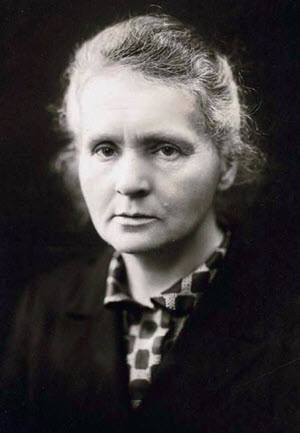
Marie Skłodowska Curie; born Maria Salomea Skłodowska 7 November 1867 – 4 July 1934) was a Polish and naturalized-French physicist and chemist who conducted pioneering research on radioactivity. She was the first woman to win a Nobel Prize, the first person and only woman to win twice, and the only person to win a Nobel Prize in two different sciences. She was part of the Curie family legacy of five Nobel Prizes. She was also the first woman to become a professor at the University of Paris, and in 1995 became the first woman to be entombed on her own merits in the Panthéon in Paris.
She was born in Warsaw, in what was then the Kingdom of Poland, part of the Russian Empire. She studied at Warsaw's clandestine Flying University and began her practical scientific training in Warsaw. In 1891, aged 24, she followed her older sister Bronisława to study in Paris, where she earned her higher degrees and conducted her subsequent scientific work. She shared the 1903 Nobel Prize in Physics with her husband Pierre Curie and physicist Henri Becquerel. She won the 1911 Nobel Prize in Chemistry.
|
| 28 | 1868 | - 27 Feb 1868—1 Dec 1868: Benjamin Disraeli - 40th British Prime Minister
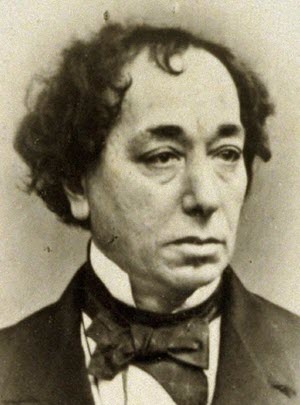
Benjamin Disraeli, 1st Earl of Beaconsfield, (21 December 1804 – 19 April 1881) was a British statesman who twice served as Prime Minister of the United Kingdom.
During his first term of office, the Conservatives remained a minority in the House of Commons and the passage of the Reform Bill required the calling of a new election once the new voting register had been compiled. Disraeli's term as Prime Minister, which began in February 1868, would therefore be short.
- 3 Dec 1868—17 Feb 1874: William Ewart Gladstone - 41st British Prime Minister
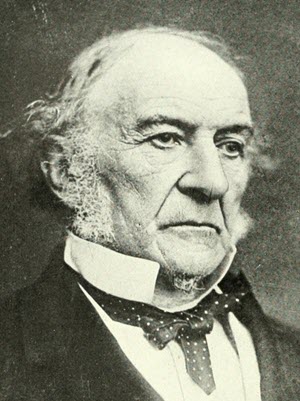
William Ewart Gladstone (29 December 1809 – 19 May 1898) was a British statesman and Liberal Party politician. In a career lasting over sixty years, he served for twelve years as Prime Minister of the United Kingdom, spread over four terms beginning in 1868 and ending in 1894.
Many reforms were passed during his first ministry, including the disestablishment of the Church of Ireland and the introduction of secret voting. After electoral defeat in 1874, Gladstone resigned as leader of the Liberal Party.
|
| 29 | 1870 | - 1870: Education Act

The 1870 Education Act stands as the very first piece of legislation to deal specifically with the provision of education in Britain. Most importantly, it demonstrated a commitment to provision on a national scale.
The Act allowed voluntary schools to carry on unchanged, but established a system of 'school boards' to build and manage schools in areas where they were needed. The boards were locally elected bodies which drew their funding from the local rates. Unlike the voluntary schools, religious teaching in the board schools was to be 'non-denominational'. A separate Act extended similar provisions to Scotland in 1872.
|
| 30 | 1871 | - 1871: Ernest Rutherford born
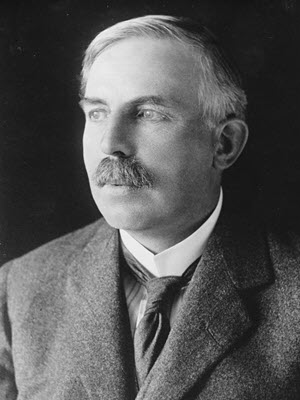
Ernest Rutherford was a New Zealand physicist known as the father of nuclear physics.
He received the Nobel Prize in Chemistry in 1908 “for his investigations into the disintegration of the elements & the chemistry of radioactive substances.” He identified & named the Alpha & Beta
|
| 31 | 1874 | - 20 Feb 1874—21 Apr 1880: Benjamin Disraeli - 42nd British Prime Minister

Benjamin Disraeli, 1st Earl of Beaconsfield, (21 December 1804 – 19 April 1881) was a British statesman who twice served as Prime Minister of the United Kingdom.
Disraeli's new government enacted many reforms, including:
- the Artisans' and Labourers' Dwellings Improvement Act 1875, which made inexpensive loans available to towns and cities to construct working-class housing.
- the Public Health Act 1875, modernising sanitary codes through the nation,
- the Sale of Food and Drugs Act (1875)
- the Education Act (1876).
- the Factory Act meant to protect workers,
- the Conspiracy, and Protection of Property Act 1875, which allowed peaceful picketing
- the Employers and Workmen Act (1875) to enable workers to sue employers in the civil courts if they broke legal contracts.
As a result of these social reforms the Liberal-Labour MP Alexander Macdonald said, "The Conservative party have done more for the working classes in five years than the Liberals have in fifty."
|
| 32 | 1876 | - 1876: The Telephone is patented

"Mr. Watson — Come here — I want to see you" were the first intelligible words spoken over the telephone, as recorded in Bell's Journal entry (10 March 1876). These are often misquoted as "Mr. Watson, come here, I want you." Watson later recounted that Bell had spilled battery acid and had called for him over the phone with these words, but this may have been in a separate incident.
|
| 33 | 1879 | - 14 Mar 1879: Albert Einstein born
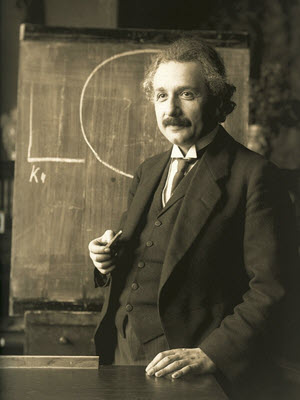
Albert Einstein (14 March 1879 – 18 April 1955) was a German-born theoretical physicist who developed the theory of relativity, one of the two pillars of modern physics (alongside quantum mechanics). His work is also known for its influence on the philosophy of science.
He is best known to the general public for his mass–energy equivalence formula E = mc2, which has been dubbed "the world's most famous equation". He received the 1921 Nobel Prize in Physics "for his services to theoretical physics, and especially for his discovery of the law of the photoelectric effect", a pivotal step in the development of quantum theory.
|
| 34 | 1880 | - 23 Apr 1880—9 Jun 1885: William Ewart Gladstone - 43rd British Prime Minister

William Ewart Gladstone (29 December 1809 – 19 May 1898) was a British statesman and Liberal Party politician. In a career lasting over sixty years, he served for twelve years as Prime Minister of the United Kingdom, spread over four terms beginning in 1868 and ending in 1894.
Historians have debated the wisdom of Gladstone's foreign-policy during his second ministry. Paul Hayes says it "provides one of the most intriguing and perplexing tales of muddle and incompetence in foreign affairs, unsurpassed in modern political history until the days of Grey and, later, Neville Chamberlain."
|
| 35 | 1881 | - 6 Aug 1881: Sir Alexander Fleming born
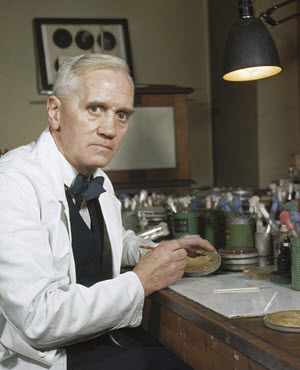
Sir Alexander Fleming (6 August 1881 – 11 March 1955) was a Scottish physician, microbiologist, and pharmacologist. His best-known discoveries are the enzyme lysozyme in 1923 and the world's first antibiotic substance benzylpenicillin (Penicillin G) from the mould Penicillium notatum in 1928, for which he shared the Nobel Prize in Physiology or Medicine in 1945 with Howard Florey and Ernst Boris Chain. He wrote many articles on bacteriology, immunology, and chemotherapy.
|
| 36 | 1884 | - 1884: The Greenwich Prime Meridian
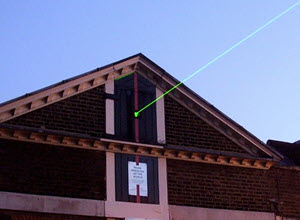
A prime meridian, based at the Royal Observatory, Greenwich, in London was established by Sir George Airy in 1851. By 1884, over two-thirds of all ships and tonnage used it as the reference meridian on their charts and maps. In October of that year, at the behest of US President Chester A. Arthur, 41 delegates from 25 nations met in Washington, D.C., United States, for the International Meridian Conference. This conference selected the meridian passing through Greenwich as the official prime meridian due to its popularity. However, France abstained from the vote, and French maps continued to use the Paris meridian for several decades.
|
| 37 | 1885 | - 23 Jun 1885—28 Jan 1886: Marquess of Salisbury 44th British Prime Minister
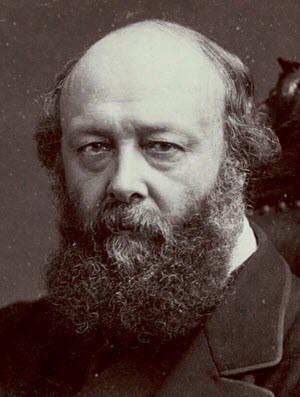
Robert Arthur Talbot Gascoyne-Cecil, 3rd Marquess of Salisbury, (3 February 1830 – 22 August 1903), styled Lord Robert Cecil before 1865 and Viscount Cranborne from June 1865 until April 1868, was a British statesman and Conservative Party politician, serving as Prime Minister three times for a total of over thirteen years. He was the last Prime Minister to head his full administration from the House of Lords.
He became Prime Minister of a minority administration from 1885 to 1886. In the November 1883 issue of National Review Salisbury wrote an article titled "Labourers' and Artisans' Dwellings" in which he argued that the poor conditions of working class housing were injurious to morality and health
|
| 38 | 1886 | - 1 Feb 1886—20 Jul 1886: William Ewart Gladstone - 45th British Prime Minister

William Ewart Gladstone (29 December 1809 – 19 May 1898) was a British statesman and Liberal Party politician. In a career lasting over sixty years, he served for twelve years as Prime Minister of the United Kingdom, spread over four terms beginning in 1868 and ending in 1894.
During this administration he first introduced his Home Rule Bill for Ireland. The issue split the Liberal Party (a breakaway group went on to create the Liberal Unionist party) and the bill was thrown out on the second reading, ending his government after only a few months and inaugurating another headed by Lord Salisbury.
- 25 Jul 1886—11 Aug 1892: Marquess of Salisbury - 46th British Prime Minister

Robert Arthur Talbot Gascoyne-Cecil, 3rd Marquess of Salisbury, (3 February 1830 – 22 August 1903), styled Lord Robert Cecil before 1865 and Viscount Cranborne from June 1865 until April 1868, was a British statesman and Conservative Party politician, serving as Prime Minister three times for a total of over thirteen years. He was the last Prime Minister to head his full administration from the House of Lords.
In 1889 Salisbury set up the London County Council and then in 1890 allowed it to build houses. However, he came to regret this, saying in November 1894 that the LCC, "is the place where collectivist and socialistic experiments are tried. It is the place where a new revolutionary spirit finds its instruments and collects its arms".
|
| 39 | 1888 | - 13 Aug 1888: John Logie Baird born
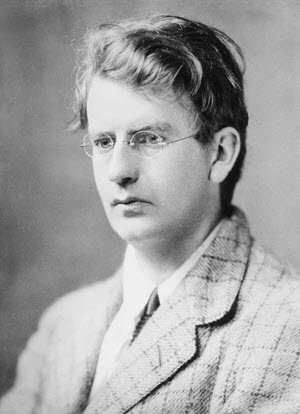
John Logie Baird (13 August 1888 – 14 June 1946) was a Scottish engineer, innovator, one of the inventors of the mechanical television, demonstrating the first working television system on 26 January 1926, and inventor of both the first publicly demonstrated colour television system, and the first purely electronic colour television picture tube.
In 1928 the Baird Television Development Company achieved the first transatlantic television transmission. Baird's early technological successes and his role in the practical introduction of broadcast television for home entertainment have earned him a prominent place in television's history.
|
| 40 | 1891 | - 20 Oct 1891: Sir James Chadwick born

Sir James Chadwick was an English physicist. When his university Professor, Ernest Rutherford became the Director of Research at Cavendish Lab, he invited Chadwick to join him. While there, he discovered the neutron, for which he won the 1935 Nobel Prize in Physics. It led to the development of the atomic bomb. He was distressed that his discovery had been used to kill many innocent people
|
| 41 | 1892 | - 1 Jan 1892: Ellis Island opens
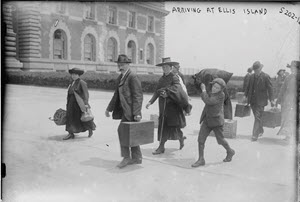
Ellis Island, in Upper New York Bay, was the gateway for over 12 million immigrants to the U.S. as the United States' busiest immigrant inspection station for over 60 years from 1892 until 1954. Ellis Island was opened January 1, 1892. The island was greatly expanded with land reclamation between 1892 and 1934. Before that, the much smaller original island was the site of Fort Gibson and later a naval magazine.
The island was made part of the Statue of Liberty National Monument in 1965 and has hosted a museum of immigration since 1990. "As a visitor to this place, you stand in awe. It has the aura of an ancient cathedral, redolent with the millions who passed through these doors."
- 15 Aug 1892—2 Mar 1894: William Ewart Gladstone - 47th British Prime Minister

William Ewart Gladstone (29 December 1809 – 19 May 1898) was a British statesman and Liberal Party politician. In a career lasting over sixty years, he served for twelve years as Prime Minister of the United Kingdom, spread over four terms beginning in 1868 and ending in 1894.
The general election of 1892 resulted in a minority Liberal government with Gladstone as Prime Minister. The electoral address had promised Irish Home Rule and the disestablishment of the Scottish and Welsh Churches.[118] In February 1893 he introduced the Second Home Rule Bill, which was passed in the Commons at second reading on 21 April by 43 votes and third reading on 1 September by 34 votes. The House of Lords defeated the bill by voting against by 419 votes to 41 on 8 September.
|
| 42 | 1894 | - 1894: Tower Bridge - London's Defining Landmark
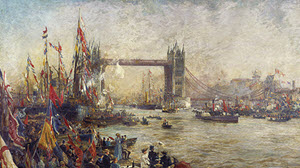
London’s iconic Tower Bridge opens. The bridge’s twin towers, high-level walkways and Victorian engine rooms now form part of the Tower Bridge Exhibition.
Tower Bridge was built to ease road traffic while maintaining river access to the busy Pool of London docks. Built with giant moveable roadways that lift up for passing ships, it is to this day considered an engineering marvel and beyond being one of London’s favourite icons, it is arguably one of the most famous and instantly recognisable structures in the entire world.
- 5 Mar 1894—22 Jun 1895: Earl of Rosebery - 48th British Prime Minister
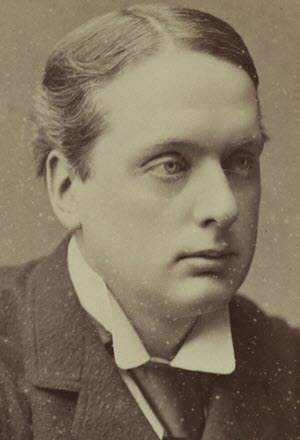
Archibald Philip Primrose, 5th Earl of Rosebery, 1st Earl of Midlothian, (7 May 1847 – 21 May 1929) was a British Liberal politician who served as Prime Minister of the United Kingdom from March 1894 to June 1895.
Rosebery's government was largely unsuccessful, as in the Armenian crisis of 1895–96. He spoke out for a strongly pro-Armenian and anti-Turkish policy. Gladstone, a prime minister in retirement, called on Britain to intervene alone. The added pressure weakened Rosebery.His designs in foreign policy, such as expansion of the fleet, were defeated by disagreements within the Liberal Party. He angered all the European powers.
|
| 43 | 1895 | - 25 Jun 1895—11 Jul 1902: Marquess of Salisbury - 49th British Prime Minister

Robert Arthur Talbot Gascoyne-Cecil, 3rd Marquess of Salisbury, (3 February 1830 – 22 August 1903), styled Lord Robert Cecil before 1865 and Viscount Cranborne from June 1865 until April 1868, was a British statesman and Conservative Party politician, serving as Prime Minister three times for a total of over thirteen years. He was the last Prime Minister to head his full administration from the House of Lords.
Among the important events of his premierships was the Scramble for Africa, culminating in the Fashoda Incident which escalated tensions with France, and the long, brutal and unpopular Second Boer War in South Africa.
|
| 44 | 1897 | |


